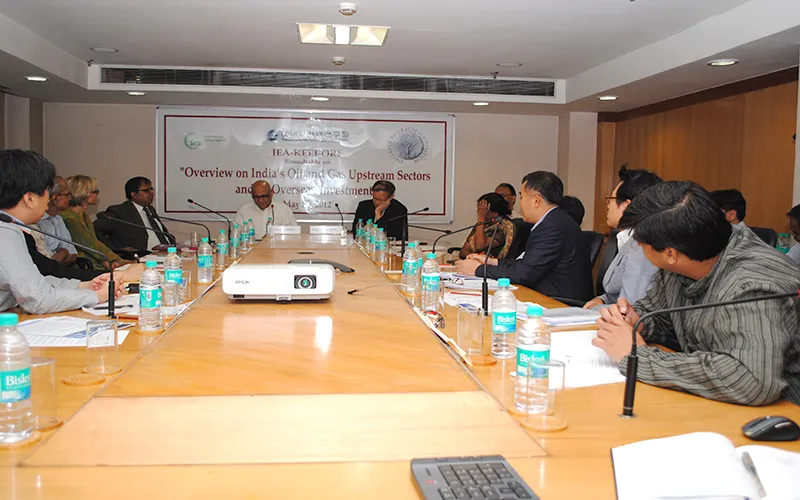-
CENTRES
Progammes & Centres
Location
With the objective of discussing India's strategy for oil and gas sector development, ORF, the International Energy Agency and the Korea Energy Economics organised a roundtable on "An Overview on India's Oil and Gas Upstream Sectors and Its Overseas Investment".

With the objective of discussing India’s strategy for oil and gas sector development, especially overseas investment, Observer Research Foundation, along with the International Energy Agency (IEA) and the Korea Energy Economics (KEEI), recently organised a roundtable on "An Overview on India’s Oil and Gas Upstream Sectors and Its Overseas Investment" at the ORF Campus in New Delhi on May 23, 2012.
With increasing dependence on imported oil and gas, what should be India’s strategy to mitigate its energy insecurity? How effective is India’s overseas upstream investment strategy? What are the implications of India’s domestic policy framework on this strategy? The roundtable discussed all these aspects. Experts from Korea, which has a 100 percent import dependency, gave their views. The roundtable was chaired by Mr. Atul Chandra, former Managing Director of the ONGC Videsh Ltd.
Mr. Atul Chandra initiated the discussion, giving a brief history on how oil exploration was begun in the north eastern region of India by the geological survey of India in 1865, roughly ten years after the drilling of the first commercial oil well in North America, which marked the dawn of the modern petroleum age. In 1955, he said, the Government of India decided to develop hydrocarbon resources on its own in various regions of the country as part of its strategy for public sector development and that the Oil & Natural Gas Directorate was set up as a subordinate office in the Oil & Gas Division of the Ministry of Natural Resources & Scientific Research. He explained how it was converted into a statutory body in 1959 by an act of the Parliament. Mr. Chandra said the main functions of the Oil & Natural Gas Commission (ONGC) were ’to plan, promote, organise and implement programmes for the development of petroleum resources and the production and sale of petroleum and petroleum products.
Mr. Uma Shankar Sharma, Senior Fellow, ORF, gave a very comprehensive perspective on India’s exploration and production policies and regulations. He explained the existing constitutional and legal framework for upstream sector in India and how the Constitution of India provides federal jurisdiction over offshore petroleum resources and respective state government jurisdiction over land resources. He pointed out that Entry 53, Schedule VII of the Constitution, gave exclusive powers to the Central Government for regulation and development of minerals and oil --
both on land and offshore. He also explained in detail various Acts, types of regimes in exploration and production, Foreign Direct Investment policy in oil & gas sector and how the Directorate General of Hydrocarbon was established. He also touched upon various aspects of India’s New Exploration Licensing Policy, sharing of cash flows between government and associated parties, investment opportunities in upstream sector, concerning issues in India’s licensing regime and the probable strategy for oil & gas sector in future.
Mr. Dulal Halder, Vice President, ONGC Videsh Ltd., gave a brief history of how ONGC Videsh was formed in 1965 as "Hydrocarbons India Private Limited and later renamed as ONGC Videsh in 1989. He explained in detail about the ONGC Videsh’s presence worldwide, their ongoing projects and investment in different countries and its future plans and strategy.
ONGC Videsh’s cumulative investment of $ 14.35 billion as on 31st Dec’11
The other important participants in the roundtable were Mr. Nam-Yll Kim, Managing Director, International Energy Cooperation Group, KEEI, Mr. Woongtae Chung, Associate Research Fellow, International Energy Cooperation Group, KEEI, Mr. Pak Yong-Duk, Senior Research Fellow, International Energy Cooperation Group, KEEI, Mr. Lee Chul Yong, Associate Research Fellow, Green Growth Research Group, KEEI, Ms. Dagmar GRACZYK, South Asia Programme Manager, Directorate of Global Energy Dialogue, IEA, Ms. Sun Joo AHN, Programme Officer for South Asia, Global Energy Dialogue, IEA,
Mr. V. Raghuraman, former Principal Advisor, CII, Mr. R. K. Jain, India Energy Forum and other ORF members.
Earlier, Mr. Young Seok Moon, Vice President of the Korea Energy Economics Institute, introduced his institute, KEEI which was established in 1986 with the focus to contribute to the national energy policy-making. Ms. Lydia Powell, Senior Fellow, ORF, welcomed the participants.
(This report is prepared by Ashish Gupta, Associate Fellow, Observer Research Foundation)
The views expressed above belong to the author(s). ORF research and analyses now available on Telegram! Click here to access our curated content — blogs, longforms and interviews.